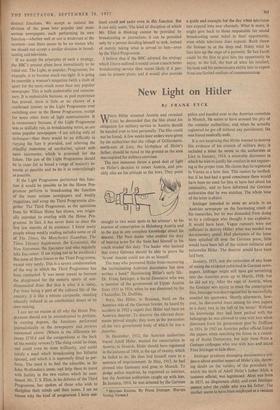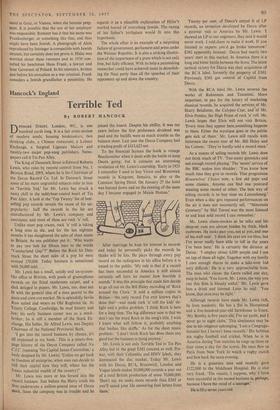New Light on Hitler
By FRANK EYCK
WHEN Hitler annexed Austria and revisited Linz, he demanded that the files about his obligation for military service in Austria should be handed over to him personally. The files could not be found. A few weeks later orders were given by the authorities that the village of Dollersheim, north-east of Linz, the birthplace of Hitler's father, should be razed to the ground as the area was required for military exercises.
The two measures throw a good deal of light on Hitler's decision to annex Austria, and pos- sibly also on his attitude to the Jews. They point
straight to two weak spots in his armour : to his evasion of conscription in Habsburg Austria and to the gap in any complete knowledge about his descent. The Nazi leader who exalted the duty of bearing arms for the State had himself in his youth evaded this duty. The leader who insisted that every German should be able to prove his `Aryan' descent could not do so himself.
The man who prevented Hitler from recovering the incriminating Austrian documents has now written a book* illuminating Hitler's early life : Dr. Franz Jetzinger, a Social Democrat who was a member of the government of Upper Austria from 1931 to 1934,' when he was dismissed by the Chancellor, Dr. Dollfliss.
Born, like Hitler, in Braunau, hard on the Austrian side of the German border, he heard by accident in 1932 a report that Hitler had been an Austrian deserter. To discover the relevant docu- ments proved simple; they were in the possession of the very government body of which he was a member.
In December, 1913, the Austrian authorities traced Adolf Hitler, wanted for conscription in Austria, to Munich. Hitler should have registered in the autumn of 1909, at the age of twenty, which he failed to do. He thus laid himself open to a sentence of imprisonment. In May, 1913, he had crossed into Germany and gone to Munich. To dodge police inquiries, he registered as stateless, but the Austrian authorities caught up with him. In January, 1914, he was arrested by the German
* HITLERS JUGEND. By Franz Jetzinger. (Europa Verlag, Vienna.)
police and handed over to the Austrian consulate in Munich. He seems to have aroused the pity of the consular authorities; and when he actually registered he got off without any punishment. He was found medically unfit.
It is not surprising that Hitler wanted to destroy this evidence of his evasion of military duty; it included a letter he wrote to the authorities at Linz in January, 1914, a miserable document in which he tries to justify his conduct in not register- ing at the proper time. He claims that he registered in Vienna at a later date. This cannot be verified; but if he had had a good conscience there would have been no need for him to have lied about his nationality, and to have informed the German authorities that he was stateless. The whole tone of the letter is abject.
Jetzinger intended to write an article in an Austrian newspaper on the fascinating result of his researches, but he was dissuaded from doing so by a colleague who thought it too explosive. It would have been. Vague rumours were not sufficient to destroy Hitler; what was needed was documentary proof. Had photostats of the letter been splashed all over the German press, little would have been left of the violent militarist and nationalist Hitler. The deserter would have been laid bare.
January, 1933, saw the extinction of any hope of seeing the evidence published in German news- papers. Jet2inger might still have got something into the Austrian press up to March, 1938; but he did not try. After the rape of Austria, when the, Gestapo was trying to trace the conscription files, Jetzinger was interrogated but he successfully asserted his ignorance. Shortly afterwards, how- ever, he discovered them among his own papers in a dusty box in the loft of his house ! Without his knowledge they had been packed with the belongings he was allowed to take with him when dismissed from his government post by Dollfuss in 1934. In 1943 an Austrian police official found the papers when searching his house in a round- up of Social Democrats, but kept these from a Gestapo colleague who was with him and asked Frau Jetzinger to hide them.
Jetzinger produces damaging documentary evi- dence about another aspect of Hitler's life, throw- ing doubt on the validity of the procedure by which the birth of Adolf Hitler's father Alois, a customs official, was legitimised. Alois was born in 1837, an illegitimate child; and even Jetzinger cannot solve the riddle who was his father. The mother seems to have been employed as a resident
maid in Graz, or Vienna, when she became preg- nant. It is possible that the son of her employer was responsible. Rumour has it that his name was Frankenberger, or something like that, and thus 'night have been Jewish. A photograph of Alois reproduced by Jetzinger is compatible with Jewish descent, but certainly does not prove it. Hitler was worried about these rumours and in 1930 con- sulted his henchman Hans Frank, a lawyer and later Governor of Poland. In his memoirs, written just before his execution as a war criminal, Frank considers a Jewish grandfather a possibility. He regards it as a plausible explanation of Hitler's morbid hatred of everything Jewish. The razing of his father's birthplace would fit into this hypothesis.
The whole affair is an example of a surprising failure-of government, parliament and press under the Weimar Republic. It is also a striking illustra- tion of the importance of a press which is not only free, but fully efficient. With its help a painstaking researcher could have achieved more in demolish- ing the Nazi party than all the speeches of their opponents up and down the country.































 Previous page
Previous page